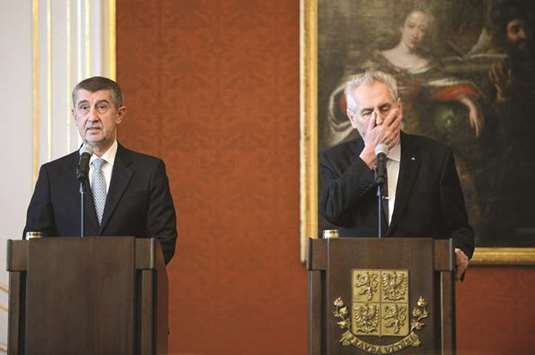Czech Prime Minister Andrej Babis is rushing to form a new government, possibly by the end of February, before a new presidential term begins.
The two candidates in a January 26-27 run-off presidential vote have diametrically opposed views on Babis, the country’s second-richest person, and whether he should serve as premier while facing a police investigation into European Union subsidy fraud.
Babis’ minority cabinet lost a parliamentary confidence vote this week, mainly because of allegations that, as a businessman a decade ago, he hid ownership of a firm to get a €2mn subsidy meant for small businesses.
He denies this.
Despite the scandal, which has hindered Babis since last year, his ANO party won three times as many votes as its nearest rival in a parliamentary election last October.
Babis said in an interview with the daily Mlada Fronta Dnes yesterday that a political crisis could arise if he does not get a second chance to form a government.
The situation is complicated by a tight presidential race between incumbent Milos Zeman, who has promised to give Babis a second try, and academic Jiri Drahos, who says it would be unacceptable to have a prime minister facing police charges.
“Certainly if we do not get a second attempt from President Zeman and the winner was Mr Drahos, who has said he would not nominate me, destabilisation and a crisis could arise,” Babis told the newspaper.
Babis was charged in the subsidy case but regained immunity from prosecution with his re-election.
Lawmakers vote today on whether to lift that immunity and are expected to do so.
Babis is also set to present his resignation to Zeman on January 24.
With new coalition talks already underway, ANO is talking to three parties: the Civic Democrats, Social Democrats and Christian Democrats.
All insist that Babis stand aside.
He has said such an option is a possibility but his party rejects this.
In a separate interview with Pravo newspaper, Drahos said he would advise Babis to step aside to help resolve the stand-off and would consult leaders of political parties to find out what government could be formed with majority backing.
Babis and Zeman are among the most popular politicians in the largely eurosceptic country that has battled the EU over taking in migrants.
The two have an uneasy alliance.
Babis backs Zeman in the presidential vote, but after the first round, said the president should distance himself from some advisers and clearly state that he is not aiming to re-orientate the country to eastern powers at the expense of western allies.

UNEASY ALLIES: This file photo taken on December 13, 2017 shows Babis (left) and Zeman at a press conference at the Hradcany Castle in Prague.
